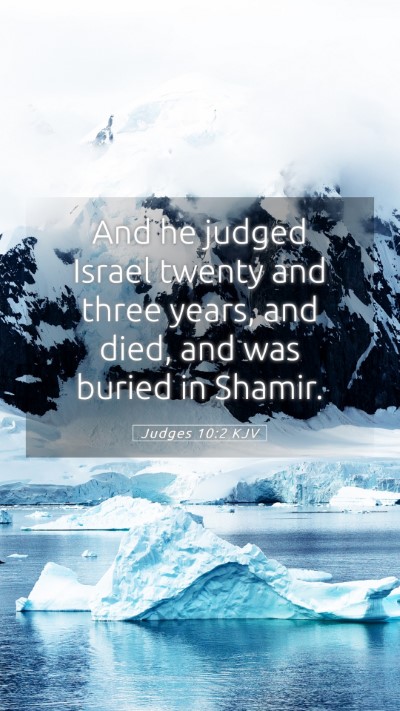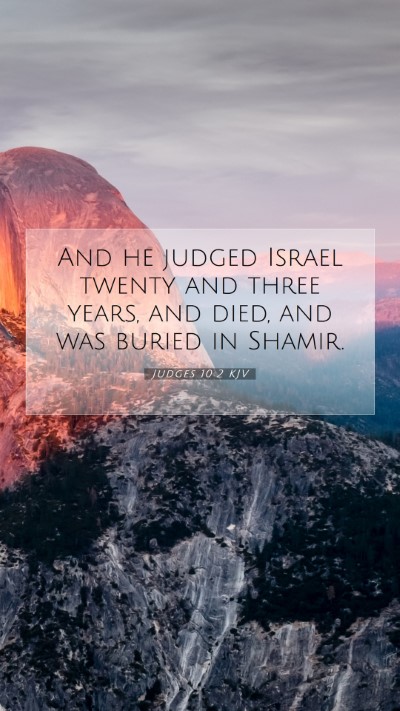Old Testament
Genesis Exodus Leviticus Numbers Deuteronomy Joshua Judges Ruth 1 Samuel 2 Samuel 1 Kings 2 Kings 1 Chronicles 2 Chronicles Ezra Nehemiah Esther Job Psalms Proverbs Ecclesiastes Song of Solomon Isaiah Jeremiah Lamentations Ezekiel Daniel Hosea Joel Amos Obadiah Jonah Micah Nahum Habakkuk Zephaniah Haggai Zechariah MalachiJudges 10:2 Meaning
What is the meaning of Judges 10:2?
And he judged Israel twenty and three years, and died, and was buried in Shamir.
Judges 10:2 Bible Verse Meaning
Judges 10:2 - Overview
This verse states, "And he judged Israel twenty and three years, and died, and was buried in Shamir." It refers to the period of a judge named Tola, who arose to deliver Israel from its plight. This passage is significant as it reflects the cyclical nature of Israel's history during the time of the judges.
Bible Verse Meanings
- Judicial Role: Tola's role as a judge was crucial, representing God’s intervention in Israel’s affairs. The word "judge" signifies not just judicial authority, but also a leader raised by God to deliver His people from oppression.
- Time of Peace: The 23 years mentioned indicates a period of stability and peace under Tola's leadership, which was often followed by strife after the judges' deaths.
- Geographical Note: Shamir, where Tola was buried, serves as a geographical marker; it underscores the local leadership and governance in Israel's tribal system.
Bible Verse Interpretations
- God's Providence: The rise of Tola signifies God’s providential care for His people, showcasing that despite their spiritual failures, God always raises leaders for deliverance.
- Cyclical Nature of Israel's History: This verse highlights a recurring theme in the Book of Judges: the pattern of Israel’s disobedience, followed by oppression, then a cry to God for help, and subsequently the raising of a judge.
Bible Verse Understanding
- Historical Context: Understanding the historical backdrop of Judges is essential for proper interpretation. Israel was often caught in a cycle of sin, suffering, supplication, and salvation.
- Spiritual Lessons: Tola's leadership invites reflection on how God uses ordinary people to accomplish His purposes and instill peace.
Bible Study Insights
- Meditation on Leadership: This verse encourages readers to consider the qualities of godly leadership and the impact of individual faithfulness on a community.
- Learning from History: Studying this period reminds modern readers of the importance of faithfulness in leadership and the blessing it brings.
Biblical Exegesis
- Analysis of "Judged": The term "judged" implies more than a legal function; it entails guiding, protecting, and leading the people in the ways of the Lord.
- Reflection on Death and Burial: Tola’s death and burial in Shamir indicates the respect given to judges, showing the significance of their role in Israelite society.
Bible Verse Commentary
- Matthew Henry: Henry emphasizes that Tola’s role was not only to judge but also to lead and protect Israel, showcasing God's mercy.
- Albert Barnes: Barnes comments on the moral condition of Israel during this time and how Tola's leadership represented divine patience and compassion.
- Adam Clarke: Clarke notes the significance of the duration of Tola’s judgeship and its impacts on Israel’s spiritual state.
Application of Bible Verse
- Personal Reflection: Readers are encouraged to reflect on their leadership roles in their communities and how they can contribute to the peace and well-being of those around them.
- Faithfulness in Service: This verse inspires believers to serve faithfully, trusting God to raise them up in their circumstances.
Related Bible Cross References
- Judges 2:16-19 - Discusses the cycle of sin and deliverance.
- Judges 12:8-10 - Refers to other judges including Ibzan, highlighting the continuity of God's leaders.
- 1 Samuel 12:11 - Mentions judges raised by God, indicating Tola's place in this tradition.


